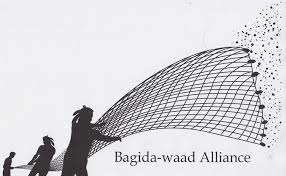Project
Last Updated on September 28, 2023

Project
Planetary Health Partnership: Anishinaabe youth guardians, land-based learning, and the practice of living well with the world will promote youth-led education, research and action that highlights and supports Indigenous knowledge and planetary health. In addition to its academic and policy related goals, the project will provide important training in research methods and digital media production for Indigenous youth, and facilitate land-based and experiential education opportunities and knowledge exchange between Indigenous Elders and youth.
In doing this the project will be divided into three thematic areas of focus: 1) Decolonizing water; 2) Decolonizing land; 3) Decolonizing conservation.
Specific project activities will include land-based learning and experiential education event(s) with youth guardians, including a ceremonial Water Walks and shoreline clean-ups around the Bruce Peninsula (Year 1), land-based learning and Indigenous knowledge sharing along the Bruce Trail through the traditional territory of the Saugeen Ojibway Nation (Year 2), and a decolonizing conservation event involving stewardship, recreation and educational activities in and around Bruce Peninsula National Park and Fathom Five Marine Reserve on the Bruce Peninsula (Year 3).
Background
Efforts to safeguard and promote human and environmental wellbeing have never been more urgent. In the context of accelerating environmental degradation, species extinction, climate change, and the related threats these pose to human health and wellbeing, it is increasingly apparent that Indigenous ways of being in the world, which emphasize interdependence and reciprocal stewardship, can offer solutions for securing planetary health and sustainability. The overarching goal of this project is to operationalize a decolonized approach to Planetary Health research that draws on and promotes Anishinaabe practices of mino biimadisiwin (living well with the world) with Indigenous youth.
Objective
The primary objectives of the project include:
1) Provide training for Anishinaabe Youth Guardians in the principles and practices of environmental stewardship, governance, and advocacy;
2) Foster social and ecological wellbeing with Anishinaabe youth through land and water based learning activities, including traditional harvesting, stewardship, recreational, and ceremonial activities;
3) Encourage and facilitate inter-generational dialogue and knowledge exchange between Indigenous Elders, Knowledge Holders and youth;
4) Training for Anishinaabe Youth Guardians in research creation and knowledge mobilization, including interviewing techniques, and digital media and documentary film production;
5) Mobilize knowledge co-created through the project for policy-makers, academics, Indigenous Peoples and the general public through multiple formats and platforms, including youth-created digital and social media content, regional public presentations and workshops, academic conferences and publications, and the production of a documentary film.
Project Team
Project Lead
Dr. James Stinson is a cultural anthropologist who specializes in political ecology and human-environment relations. His research has focused on the management of national parks and protected areas in Canada and Latin America, and the participation of Indigenous Peoples nature conservation. His current research involves working with youth from the Saugeen Ojibway Nation to document Indigenous conceptions of, and responses to, climate change on Lake Huron and Georgian Bay.
Team Members
James Stinson - Principle Investigator
Natasha Akiwenzie - Co-Investigator
Victoria Serda - Co-Investigator
Kate Tilleczek - Co-Investigator
James Orbinski - Co-Investigator
Robin Roth - Co-Investigator
Biidaabinokwe Jessica Keeshig-Martin, Collaborator
Mark Terry - Collaborator
Waasekom - Project Coordinator
Ningwakwe George - Elder Advisor
Funding
This project has been funded through a Partnership Development Grant from the Social Sciences and Humanities Research Council.

Themes | Planetary Health |
Status | Active |
Related Work |
N/A
|
Updates |
N/A
|
People |
James Stinson, Postdoctoral Fellow, Planetary Health & Education - Active
Rebecca Babcock, Research Assistant, Global Health and Humanitarianism - Alum |
You may also be interested in...
Update – Partnership for Youth and Planetary Wellbeing with Local NGOs and Community Organizations in Belize
In March 2023, Dahdaleh Institute postdoctoral research fellow James Stinson returns from a week-long research trip to commence activities for the Partnership For Youth and Planetary Wellbeing – in Belize, he visited and worked with ...Read more about this Post
Recap — Research Exploration: Taking a Critical Social Science Approach to Global Health Research
The Dahdaleh Institute held its fourth annual Critical Social Science Perspectives in Global Health Research Workshop (CPGH) as a hybrid event on Wednesday, March 29, 2023. This year, over 30 researchers participated to discuss the ...Read more about this Post
Internship Program: Summer 2022 In Review
The Dahdaleh Institute worked with exceptional students this summer through our global health internship program, including students hired through the Research at York program, completing program practicums with us, and volunteers. Our interns conducted literature ...Read more about this Post
